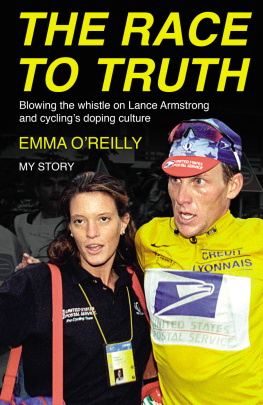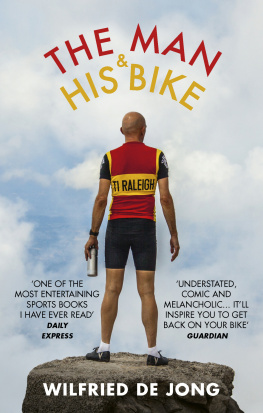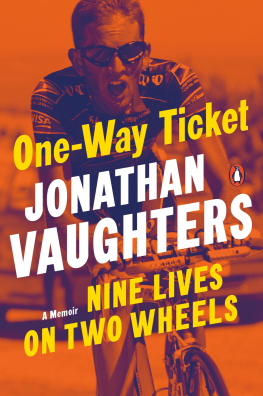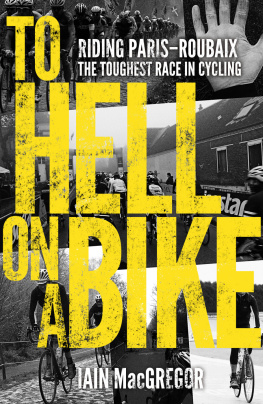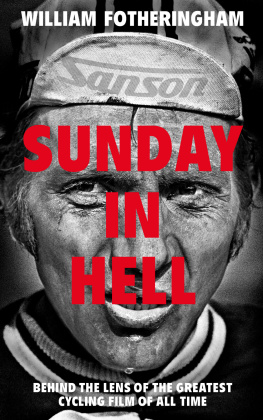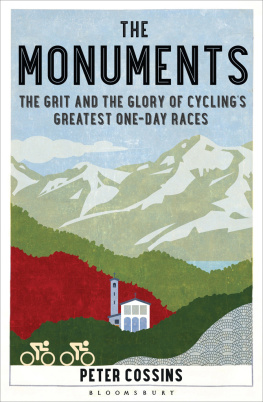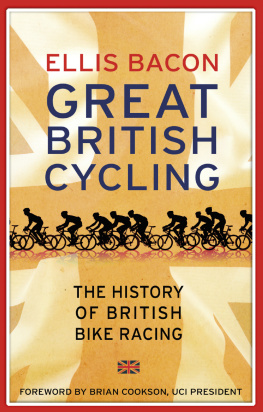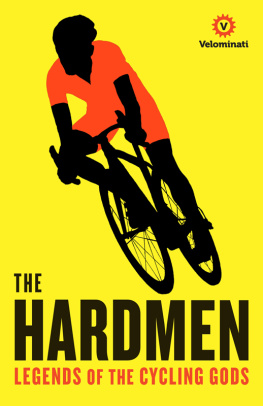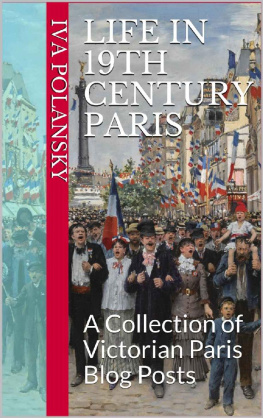ParisRoubaix: The Inside Story
All the bumps of cyclings cobbled classic
LesWoodland

McGann Publishing
Cherokee Village, Arkansas
Better to reign in hell than to serve in heaven.
Paradise Lost , John Milton (16081674)
Preface to the Kindle Edition
The are all at the end of the book. When you come to a place in the book that has a photo of a rider, there will be a link that will take you to the photo. At each photo is a link to return you where you were in the text.
After the photos, you will find a containing excerpts from other cycling books from McGann Publishing. All are available from amazon.com in either print or Kindle versions. We hope you will find something you like there!
Cover photo: riders in the 2007 ParisRoubaix on the Moulin de Vertain cobble sector
Men transformed into dusty or mud-caked zombies locked in a battle for survival. Their machines, submitted to the traps of a demented road, fall prey to repeated technical incidents. The falls, individual or collective, open the pages of a perpetual tragedy.
Vlo Magazine, 2004
Introduction
One of the worlds least inviting bike rides follows the western European coast from the cold north towards the warmer south. Then, just as you hope the weather will improve, it crosses to England and goes north again. Its a chilly ride because it circuits the gray, gloomy North Sea. And the North Sea is never a place of parasols and hula girls.
It was out on the North Sea in the Seventies that a ship called the Mi Amigo housed an unlicensed pop radio station of the same name. It was run by a Belgian waffle entrepreneur. He never saw why everybody else thought that so funny. Radio Mi Amigo played commercials for anyone but especially it advertised Suzy waffles. Those who hadnt already giggled succumbed when they heard they were named after the waffle-makers wife from whom he shortly separated.
The station had enormous audiences in Holland and Belgium, where they heard the advertisements and whichbeing in Dutchthey understood. One of the ads included the excited voice of a Belgian sports commentator.
Daar komt-ie, de sterkste, de winnaarMARC DEMEYER WINT PARIJSROUBAIX! he screamed . In the background the crowd went wild, for Roubaix is close to the Belgian border and Belgians climb into their red-numbered cars and drive over the border and feel close to home.
Demeyer wonif you believed the adsby chewing Stimorol gum. But it didnt do him much good. He died shortly afterward of a heart attack as he sat doing a crossword puzzle in front of his television. He was 32. And Sylvain TackMr Suzy Wafflesalso came to an unhappy end. New laws put an end to his radio station and an encounter with customs officials in Paris put an end to his libertyfor smuggling three kilograms of cocaine. He died at home in Oudenberg in February 2006, a sad and broken recluse.
Belgians have long seen ParisRoubaix as theirs. The greatest of them all was Roger De Vlaeminck, a gypsy-looking man who more drifted than bounced across the cobbles. Belgians like ParisRoubaix because it matches their Tour of Flanders, the Ronde van Vlaanderen, which also has as many cobbles as the organizers can find. Spectators come into France and wait until ParisRoubaix has passed and then prize up a cobblestone to take home. A group of enthusiasts called Les Amis de ParisRoubaix does its best to replace them but there are always plenty enough missing cobbles to give the race a bike-breaking, back-breaking quality that excites some and scares many.
Two novice rookies were once listed to ride. Theyd seen it on television and theyd heard of the broken bones. Theyd seen the race riding slippery, mud-covered cobbles at speeds greater than they cared to imagine. Theyd seen riders and bikes snapping in watery holes. They spent a sleepless night in their hotel. And next morning they went back home.
Anybody could see why. Who would face six or seven hours of purgatory and the serious risk of a broken legfor such things have happenedto be no better than an also-ran, an also-fallen? For the tailenders dont get even a ride round the track at the finishbecause thats open only to the first arrivals.
Bernard Hinault dismissed ParisRoubaix as une cochonnerie de course , which isnt easy to translate but is unflattering. Not that that stopped his winning in 1981. Jacques Anquetil, frustrated by a flat tire 13 kilometers from the end in 1958, called it a dangerous lottery. Others, like De Vlaeminck, made a career of it. Some, said Stephen Roche, would kill their own mother to get on the podium. Its what Jacques Goddet called the last great madness of cycling. It should live, he said, for that reason alone.
They call ParisRoubaix the Hell of the North. The American writer James Startt tells of an American television crew reporting it for the first time.
They were relieved to find a key figure in the race, Theo De Rooy, who could speak English, he wrote. What made the race memorable was De Rooys early break, a planned sacrifice that somehow put him in a position to win. But as he seized this chance of a lifetime, he flatted and crashed while in the lead, finishing a long way from first.
No sooner was De Rooy off his bike than the CBS crew jumped on him. His haggard face was covered with mud and blood when they asked for his race impressions. He was so exhausted he could hardly speak, but he muttered something about how hard and heartbreaking ParisRoubaix could be.
What he is actually said to have muttered demonstrates the command of English youd expect of a former world university champion: Its a bollocks this race! Youre working like an animal, you dont have time to piss, you wet your pants. Youre riding in mud like this, youre slipping, its a piece of shit
He sounded so miserable and the CBS people were so new to the race that the reporter, John Tesh, asked if he would ever ride again.
De Rooys face transformed. Ride it again? he asked. Of course I will. This is the most beautiful race in the world.
Complete known results for every edition of ParisRoubaix can be found on the publishers website, www.bikeraceinfo.com/classics/paris-roubaix/paris-roubaix-index.html
Today we are visiting a world that would have been forgotten if one day a bike race hadnt had this crazy idea, once a year, of turning left on the way out from Troisvilles, leaving the civilization of the car to plunge into the meandering history of the Nord. The names are devilishly evocative: Inchy, VerchainMaugr, Qurnaing. They are the first stations of the cross. You couldnt invent something like that.
Philippe Bouvet, Lquipe , 2006
To a Cyclist, Its Beautiful
You have a lot of trouble selling your wares if you make beer, cigarettes or running shoes. Youre either not allowed to say what they doDrink our beer and itll make you drunkor theres not enough space on the page to try. So it is with running shoes. A while back, one company tried a different approach. It heaped a dozen battered, stained and sweat-stained shoes and beneath them wrote: To a runner, theyre beautiful.
And so it goes for the town of Roubaix. For cyclists it is the end of the rainbow. For the rest of France, it is an embarrassment, a run-down place so close to Belgium that you wonder they dont push it across the border. If an enemy again invaded, nobody would defend Roubaix.
Whats surprising is that somewhere that means so much to cyclists counts for so little in the country that made it famous. Because Roubaix now isnt so much a town in its own right, although thats its status, but a suburb of Lille. Things arent always wonderful in Lille, either, but it has risen and it was 2004s European capital of culture. It has historyCharles de Gaulle was born there, for instanceand it has status. It is the number one town of the Nord region, a business center, a city of a quarter of a million. Its mayor, Martine Aubry, is of national status in French politics.


